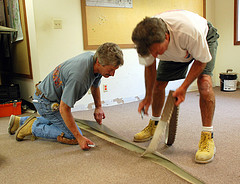What is the Best Type of Carpet for Allergy Sufferers?
Many people often find themselves coughing and sneezing. For some, especially if you live in a cold climate like Saint Paul, it could just be due to the cold weather. For others, it may be seasonal allergies or even asthma. However, you may have noticed that often in carpeted rooms the coughing and sneezing gets worse. That’s because allergens such as pollen, dust, mold and other organisms find their way into your home and get trapped in the carpet fibers. Despite this, there are still ways for people with allergies and sensitivities to dust and other particles to have carpeting in their home without having allergic reactions.
Why Carpet is Bad for Allergies
As mentioned above, allergenic particles get trapped in carpet fibers. Every time you move or step on the carpet you cause the particles to be released into the air. Once circulating, the particles are inhaled, causing you to sneeze and cough. In addition, during installation, many chemicals are involved which can aggravate allergies. The padding and adhesive that is installed can often emit volatile organic compounds (VOC) which can cause respiratory irritations, headaches, rashes and more.
What Kind of Carpet is Best?
Today, there are many carpets made of synthetic materials. These are much better for allergy sufferers because the materials repel allergens. The most effective allergy-controlling carpet fibers are nylon. The least effective are wool because allergens and mold thrive there. In addition, shag carpeting should be avoided because the shorter the strands the less area there is for particles to be trapped in. Similarly, more tightly woven strands are also better at keeping allergens away. Furthermore, it’s important to purchase carpeting with a low VOC level to ensure your home is safe of toxic emissions which, aside from more serious health issues, can also cause allergic reactions.
Additional Tips
When installing a new carpet there are a number of steps you can take to prevent aggravating allergies. For one, have your carpet installer unroll and air out the carpet in a well-ventilated area before installing it. Additionally, have any sensitive individuals leave your home during and immediately following the installation. Once installed, be sure to ventilate the room properly by opening windows and using fans to increase the amount of fresh air exchanged in the room. This will send away dust and other particles that came with the carpet.
Proper maintenance of your carpet will also help reduce allergy-related problems. Be sure to vacuum and clean your carpet regularly. You should also consider hiring professional carpet cleaners to perform a periodic deep clean using steam and other methods.
If you have small children it’s especially important to take the precautions mentioned above. For one, children's immune systems are more sensitive to foreign substances like the ones found in carpets. In addition, small children spend a lot of their time either on the ground or standing not too high off of it.
Be sure to consult with a professional carpet installer who can instruct you on the safest, healthiest type of carpet.
Looking for a Pro? Call us (866) 441-6648

Flooring Average Costs
Flooring Contractors Experiences

Hardwood Floor Repair Done Perfectly AND Painlessly

Glossy New Kitchen Floor Tile … At Last!




